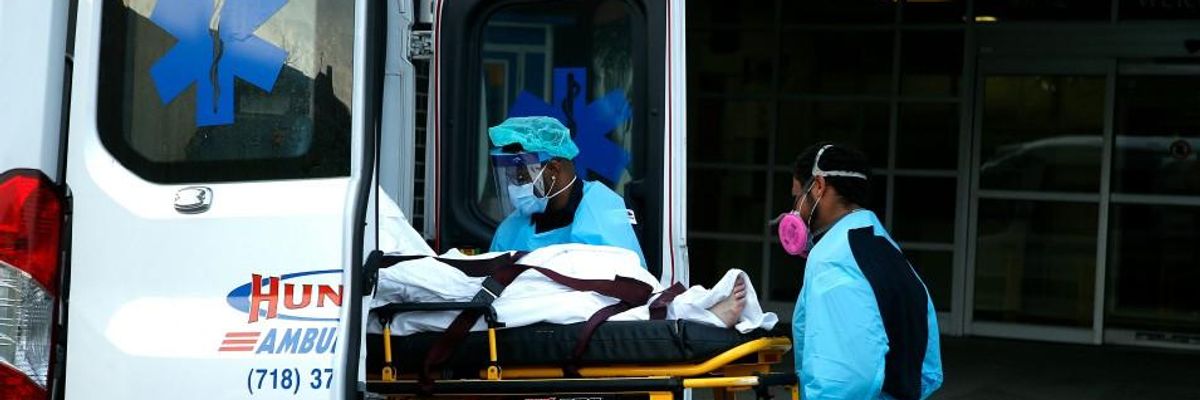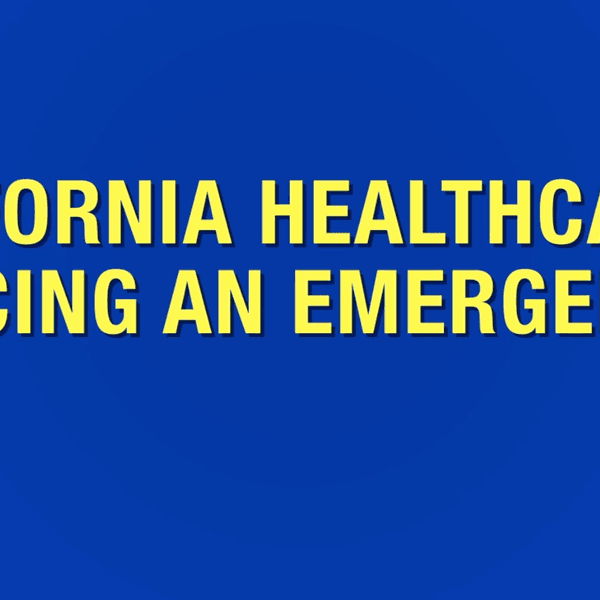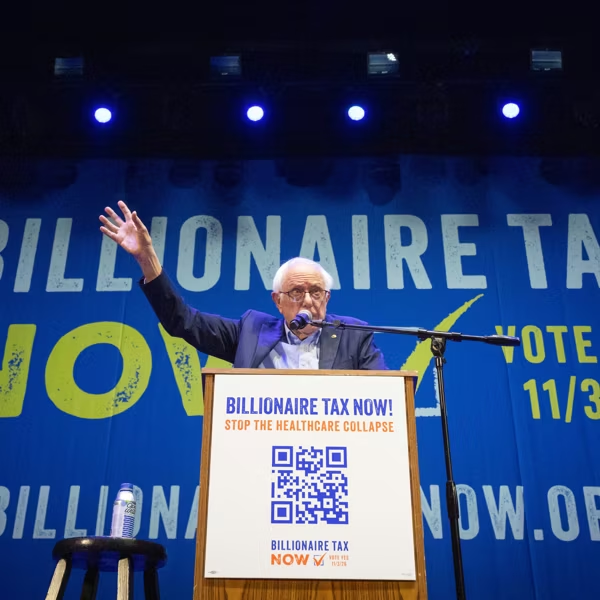
A patient is transferred from Elmhurst Hospital in New York on April 25, 2020. (Photo: John Lamparski/NurPhoto via Getty Images)
'Here We Go Again': Richest Hospitals Sitting on Billions in Cash Got Golden Bailouts Compared to Those Serving Poorest
"If you ever hear a hospital complaining they don't have enough money, see if they have a venture fund."
While critics have noted in recent weeks the ways in which the Covid-19 pandemic has "laid bare some of the dysfunctions and inequalities in the American healthcare system," new reporting Monday reveals how some of the wealthiest hospital groups in the United States have received huge infusions of federal rescue funds even as they sat on billions of dollars in cash reserves and poorer hospitals and clinics struggle to maintain bare-minimum levels of service.
According to the New York Times, a disproportionate amount of the $72 billion approved by Congress to bolster hospitals amid the coronavirus outbreak is flowing "to hospitals that had already built up deep financial reserves to help them withstand an economic storm. Smaller, poorer hospitals are receiving tiny amounts of federal aid by comparison."
The reporting, some of it based on an analysis by the watchdog group Good Jobs First, notes that many of the wealthy hospital groups that received an outsize share of the funds--including well-healed outfits like Cleveland Clinic, Ascension Health, and the Providence Health System--"are set up as nonprofits, which generally don't have to pay federal taxes on their billions of dollars of income. By contrast, hospitals that serve low-income patients often have only enough cash on hand to finance a few weeks of their operations."
The large tax reserves of these wealthy hospital groups "come from a mix of sources," the Times reports: "no-strings-attached private donations, income from investments with hedge funds and private equity firms, and any profits from treating patients. Some chains, like Providence, also run their own venture-capital firms to invest their cash in cutting-edge start-ups. The investment portfolios often generate billions of dollars in annual profits, dwarfing what the hospitals earn from serving patients."
The findings were not surprising to critics of the corporate nature of the U.S. hospital system and the deep inequities it creates:
The Financial Times last month detailed how Covid-19 was both exposing and exacerbating pre-existing inequities and inefficiencies that are fundamental to the for-profit healthcare system in the U.S.:
Even though the US spends trillions of dollars on healthcare, much of that is wasted. The funding gets used up by bureaucrats that have to code and bill every action a doctor takes, by doctors and hospital administrators paid far more than their European counterparts and by the soaring cost of drugs. A study last year in The Journal of the American Medical Association found at least $760bn was wasted in unnecessary health spending -- more than the US spends on primary and secondary education.
Poorer hospitals that cater to low-income urban communities, or rural areas where population is declining, are dependent on government insurance. They say the payments from Medicaid do not cover their costs as the price of staff, equipment and drugs rises.
The new reporting on the distribution of funds suggests concerns over poorer hospitals succumbing to the financial pressures of the pandemic were justified--a concern that also shines a spotlight on the manner in which the Trump administration managed the funds. From the Times:
After the CARES Act was passed in March, hospital industry lobbyists reached out to senior Health and Human Services officials to discuss how the money would be distributed.
Representatives of the American Hospital Association (AHA), a lobbying group for the country's largest hospitals, communicated with Alex M. Azar II, the department secretary, and Eric Hargan, the deputy secretary overseeing the funds, said Tom Nickels, a lobbyist for the group. Chip Kahn, president of the Federation of American Hospitals, which lobbies on behalf of for-profit hospitals, said he, too, had frequent discussions with the agency.
The department then devised formulas to quickly dispense tens of billions of dollars to thousands of hospitals--and those formulas favored large, wealthy institutions.
While some Democrats on Capitol Hill have raised issued about the funding disparities, it's not clear if the Trump administration will pay any political cost.
In response to the reported figures, advocates for Medicare for All pointed to the hospital industry lobby groups--which leverage massive profits to repeatedly steer Congress away from a single-payer solution to the nation's healthcare dysfunctions--to ask if they would support reapportioning those billions towards hospitals and clinics more in need.
Niall Brennan, president of the nonprofit Health Care Cost Institute and a former senior Medicare official, put it this way to the Times: "If you ever hear a hospital complaining they don't have enough money, see if they have a venture fund. If you've got play money, you're fine."
An Urgent Message From Our Co-Founder
Dear Common Dreams reader, The U.S. is on a fast track to authoritarianism like nothing I've ever seen. Meanwhile, corporate news outlets are utterly capitulating to Trump, twisting their coverage to avoid drawing his ire while lining up to stuff cash in his pockets. That's why I believe that Common Dreams is doing the best and most consequential reporting that we've ever done. Our small but mighty team is a progressive reporting powerhouse, covering the news every day that the corporate media never will. Our mission has always been simple: To inform. To inspire. And to ignite change for the common good. Now here's the key piece that I want all our readers to understand: None of this would be possible without your financial support. That's not just some fundraising cliche. It's the absolute and literal truth. We don't accept corporate advertising and never will. We don't have a paywall because we don't think people should be blocked from critical news based on their ability to pay. Everything we do is funded by the donations of readers like you. Will you donate now to help power the nonprofit, independent reporting of Common Dreams? Thank you for being a vital member of our community. Together, we can keep independent journalism alive when it’s needed most. - Craig Brown, Co-founder |
While critics have noted in recent weeks the ways in which the Covid-19 pandemic has "laid bare some of the dysfunctions and inequalities in the American healthcare system," new reporting Monday reveals how some of the wealthiest hospital groups in the United States have received huge infusions of federal rescue funds even as they sat on billions of dollars in cash reserves and poorer hospitals and clinics struggle to maintain bare-minimum levels of service.
According to the New York Times, a disproportionate amount of the $72 billion approved by Congress to bolster hospitals amid the coronavirus outbreak is flowing "to hospitals that had already built up deep financial reserves to help them withstand an economic storm. Smaller, poorer hospitals are receiving tiny amounts of federal aid by comparison."
The reporting, some of it based on an analysis by the watchdog group Good Jobs First, notes that many of the wealthy hospital groups that received an outsize share of the funds--including well-healed outfits like Cleveland Clinic, Ascension Health, and the Providence Health System--"are set up as nonprofits, which generally don't have to pay federal taxes on their billions of dollars of income. By contrast, hospitals that serve low-income patients often have only enough cash on hand to finance a few weeks of their operations."
The large tax reserves of these wealthy hospital groups "come from a mix of sources," the Times reports: "no-strings-attached private donations, income from investments with hedge funds and private equity firms, and any profits from treating patients. Some chains, like Providence, also run their own venture-capital firms to invest their cash in cutting-edge start-ups. The investment portfolios often generate billions of dollars in annual profits, dwarfing what the hospitals earn from serving patients."
The findings were not surprising to critics of the corporate nature of the U.S. hospital system and the deep inequities it creates:
The Financial Times last month detailed how Covid-19 was both exposing and exacerbating pre-existing inequities and inefficiencies that are fundamental to the for-profit healthcare system in the U.S.:
Even though the US spends trillions of dollars on healthcare, much of that is wasted. The funding gets used up by bureaucrats that have to code and bill every action a doctor takes, by doctors and hospital administrators paid far more than their European counterparts and by the soaring cost of drugs. A study last year in The Journal of the American Medical Association found at least $760bn was wasted in unnecessary health spending -- more than the US spends on primary and secondary education.
Poorer hospitals that cater to low-income urban communities, or rural areas where population is declining, are dependent on government insurance. They say the payments from Medicaid do not cover their costs as the price of staff, equipment and drugs rises.
The new reporting on the distribution of funds suggests concerns over poorer hospitals succumbing to the financial pressures of the pandemic were justified--a concern that also shines a spotlight on the manner in which the Trump administration managed the funds. From the Times:
After the CARES Act was passed in March, hospital industry lobbyists reached out to senior Health and Human Services officials to discuss how the money would be distributed.
Representatives of the American Hospital Association (AHA), a lobbying group for the country's largest hospitals, communicated with Alex M. Azar II, the department secretary, and Eric Hargan, the deputy secretary overseeing the funds, said Tom Nickels, a lobbyist for the group. Chip Kahn, president of the Federation of American Hospitals, which lobbies on behalf of for-profit hospitals, said he, too, had frequent discussions with the agency.
The department then devised formulas to quickly dispense tens of billions of dollars to thousands of hospitals--and those formulas favored large, wealthy institutions.
While some Democrats on Capitol Hill have raised issued about the funding disparities, it's not clear if the Trump administration will pay any political cost.
In response to the reported figures, advocates for Medicare for All pointed to the hospital industry lobby groups--which leverage massive profits to repeatedly steer Congress away from a single-payer solution to the nation's healthcare dysfunctions--to ask if they would support reapportioning those billions towards hospitals and clinics more in need.
Niall Brennan, president of the nonprofit Health Care Cost Institute and a former senior Medicare official, put it this way to the Times: "If you ever hear a hospital complaining they don't have enough money, see if they have a venture fund. If you've got play money, you're fine."
While critics have noted in recent weeks the ways in which the Covid-19 pandemic has "laid bare some of the dysfunctions and inequalities in the American healthcare system," new reporting Monday reveals how some of the wealthiest hospital groups in the United States have received huge infusions of federal rescue funds even as they sat on billions of dollars in cash reserves and poorer hospitals and clinics struggle to maintain bare-minimum levels of service.
According to the New York Times, a disproportionate amount of the $72 billion approved by Congress to bolster hospitals amid the coronavirus outbreak is flowing "to hospitals that had already built up deep financial reserves to help them withstand an economic storm. Smaller, poorer hospitals are receiving tiny amounts of federal aid by comparison."
The reporting, some of it based on an analysis by the watchdog group Good Jobs First, notes that many of the wealthy hospital groups that received an outsize share of the funds--including well-healed outfits like Cleveland Clinic, Ascension Health, and the Providence Health System--"are set up as nonprofits, which generally don't have to pay federal taxes on their billions of dollars of income. By contrast, hospitals that serve low-income patients often have only enough cash on hand to finance a few weeks of their operations."
The large tax reserves of these wealthy hospital groups "come from a mix of sources," the Times reports: "no-strings-attached private donations, income from investments with hedge funds and private equity firms, and any profits from treating patients. Some chains, like Providence, also run their own venture-capital firms to invest their cash in cutting-edge start-ups. The investment portfolios often generate billions of dollars in annual profits, dwarfing what the hospitals earn from serving patients."
The findings were not surprising to critics of the corporate nature of the U.S. hospital system and the deep inequities it creates:
The Financial Times last month detailed how Covid-19 was both exposing and exacerbating pre-existing inequities and inefficiencies that are fundamental to the for-profit healthcare system in the U.S.:
Even though the US spends trillions of dollars on healthcare, much of that is wasted. The funding gets used up by bureaucrats that have to code and bill every action a doctor takes, by doctors and hospital administrators paid far more than their European counterparts and by the soaring cost of drugs. A study last year in The Journal of the American Medical Association found at least $760bn was wasted in unnecessary health spending -- more than the US spends on primary and secondary education.
Poorer hospitals that cater to low-income urban communities, or rural areas where population is declining, are dependent on government insurance. They say the payments from Medicaid do not cover their costs as the price of staff, equipment and drugs rises.
The new reporting on the distribution of funds suggests concerns over poorer hospitals succumbing to the financial pressures of the pandemic were justified--a concern that also shines a spotlight on the manner in which the Trump administration managed the funds. From the Times:
After the CARES Act was passed in March, hospital industry lobbyists reached out to senior Health and Human Services officials to discuss how the money would be distributed.
Representatives of the American Hospital Association (AHA), a lobbying group for the country's largest hospitals, communicated with Alex M. Azar II, the department secretary, and Eric Hargan, the deputy secretary overseeing the funds, said Tom Nickels, a lobbyist for the group. Chip Kahn, president of the Federation of American Hospitals, which lobbies on behalf of for-profit hospitals, said he, too, had frequent discussions with the agency.
The department then devised formulas to quickly dispense tens of billions of dollars to thousands of hospitals--and those formulas favored large, wealthy institutions.
While some Democrats on Capitol Hill have raised issued about the funding disparities, it's not clear if the Trump administration will pay any political cost.
In response to the reported figures, advocates for Medicare for All pointed to the hospital industry lobby groups--which leverage massive profits to repeatedly steer Congress away from a single-payer solution to the nation's healthcare dysfunctions--to ask if they would support reapportioning those billions towards hospitals and clinics more in need.
Niall Brennan, president of the nonprofit Health Care Cost Institute and a former senior Medicare official, put it this way to the Times: "If you ever hear a hospital complaining they don't have enough money, see if they have a venture fund. If you've got play money, you're fine."

